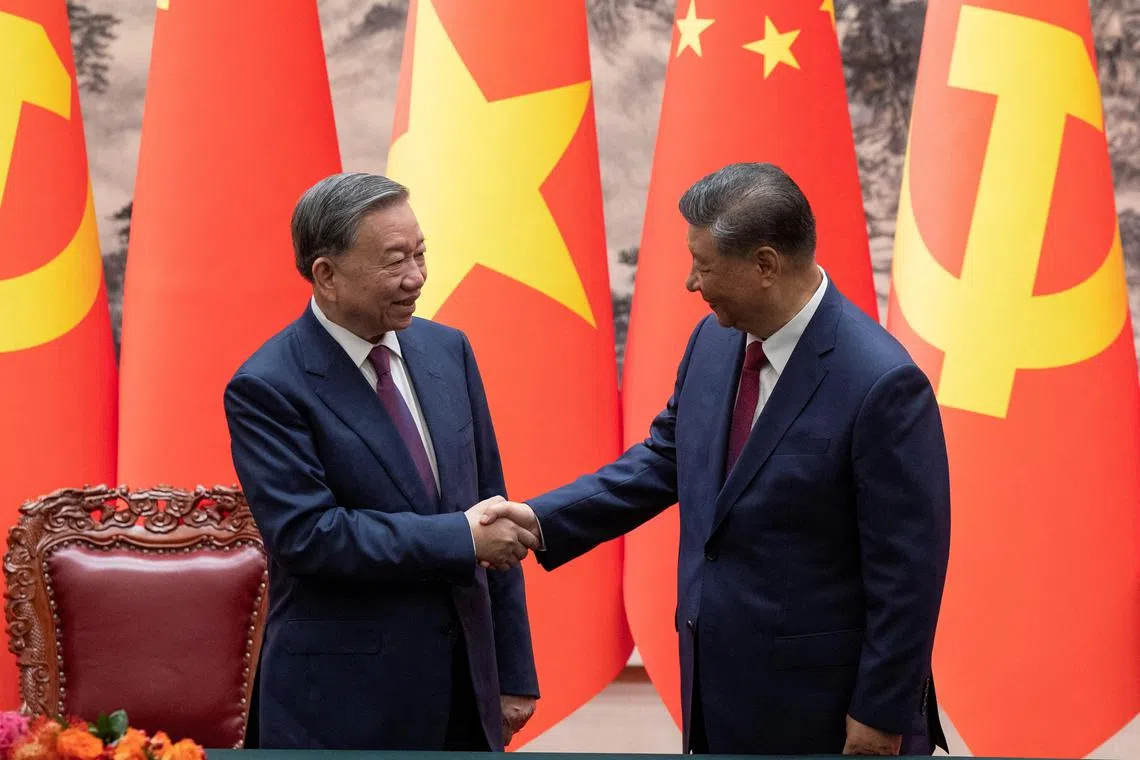Beijing, Hanoi pledge to deepen ties on Vietnam leader To Lam’s first trip abroad
Sign up now: Get insights on Asia's fast-moving developments

Chinese President Xi Jinping (right) and his new Vietnamese counterpart To Lam after a signing ceremony at the Great Hall of the People in Beijing, on Aug 19.
PHOTO: REUTERS
Follow topic:
BEIJING – Chinese President Xi Jinping and his new Vietnamese counterpart To Lam on Aug 19 pledged to deepen bilateral relations, a sign that economic and political ties will remain strong as Hanoi continues to seek balanced relations with major powers.
In Beijing, both leaders witnessed the signing of bilateral cooperation documents, in areas such as party school exchanges, finance, connectivity and media organisations, during Mr Lam’s first overseas state trip after being elected Vietnam’s top leader on Aug 3.
“I am willing to establish a good working relationship and personal friendship with you,” Mr Xi told Mr Lam during their meeting at the Great Hall of the People.
Mr Xi hailed Mr Lam’s predecessor, the late Nguyen Phu Trong, for his “outstanding contributions to the cause of China-Vietnam friendship”, according to Chinese state media CCTV.
Mr Trong served three terms as general secretary of the Communist Party of Vietnam until he died of illness at the age of 80 on July 19.
Mr Lam told Mr Xi that his three-day China visit shows that “the Vietnamese party and state have always attached great importance to relations with China, and regard it as a strategic choice and top priority of Vietnam’s foreign policy”.
Vietnam’s government said both leaders agreed to boost defence and security ties as well as railway and highway links between the two countries,
While Vietnam has traditionally been suspicious of its larger neighbour, its “bamboo diplomacy” of being firm but flexible in its dealings with major powers from China to the United States, Russia and India, is set to continue, said analysts.
This is even as more contentious bilateral issues, such as overlapping claims in the South China Sea, have not been resolved.
In July, Vietnam unilaterally submitted to the United Nations a claim for an extended continental shelf in the waterway – a move that China has opposed.
China has been Vietnam’s largest trading partner for 20 years. Two-way trade reached US$112.2 billion (S$146.9 billion) in the first seven months of 2024, up by 25 per cent year on year.
Mr Phan Xuan Dung, a PhD student at the Australian National University who analyses Vietnam’s foreign policy, said it was unsurprising for Mr Lam to choose China for his first overseas visit.
Mr Lam needs to continue Mr Trong’s legacies, including bamboo diplomacy, to bolster his legitimacy in this early stage of his leadership, Mr Phan told The Straits Times.
It is also customary for new general secretaries of the Communist Party of Vietnam to make China their first foreign destination after taking office, he added, given both sides’ close party-to-party ties.
He said: “It is reasonable to expect that Vietnam under To Lam will continue to deepen its engagement with the West at the same time that it does so with China.”
China-Vietnam ties received a boost in December 2023 when Mr Xi made a two-day visit to Vietnam. This came after US-Vietnam relations were upgraded when US President Joe Biden visited Hanoi in September 2023.
Bloomberg reported that Mr Lam is scheduled to attend the UN General Assembly in the US in September, and could meet Mr Biden.
Professor Zhao Weihua from Fudan University, whose expertise includes Vietnam’s politics and foreign policy, said the US has been trying to exert pressure on Vietnam and get Hanoi to decouple from China.
He said this pressure was manifested in the US’ rejection of Vietnam’s bid to change its non-market economy status earlier in August, a decision which disappointed Hanoi. The change in classification would have reduced tariffs on Vietnamese goods entering the US market.
“However, General Secretary To Lam chose to visit China first after taking office and achieved fruitful results (from the visit), which shows that the US cannot change the direction of development of China-Vietnam relations,” he told ST.
Mr Lam is a police general and former minister for public security who played a key role in an intensified anti-corruption campaign that has resulted in the dismissals earlier in 2024 of key political leaders such as Vietnam’s president and chairman of the National Assembly.
Other commentators have drawn similarities between Mr Xi and Mr Lam, highlighting the Vietnamese leader’s authoritarian tendencies because of his previous security-related roles.
But Dr Le Hong Hiep, coordinator of the Vietnam Studies Programme at the ISEAS – Yusof Ishak Institute in Singapore, believes that while Mr Lam may tighten Vietnam’s political environment and restrict civic space, this may not affect the country’s foreign policies.
Vietnam will continue to balance its relationships with the major powers, particularly China and the US, and pursue friendly ties with all important global actors, Dr Hiep wrote on Aug 19, in a commentary on the institute’s Fulcrum website. “This approach is currently the best foreign policy option for Vietnam, regardless of who is at the helm of the CPV (Communist Party of Vietnam).”

